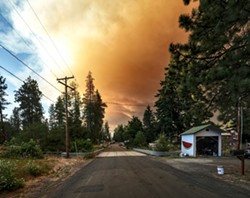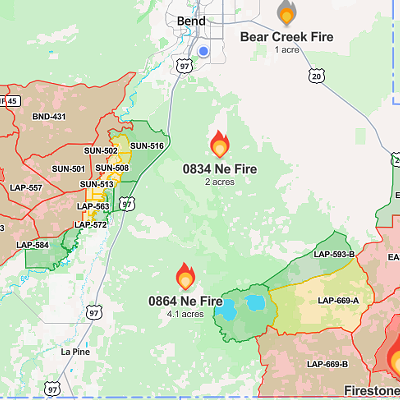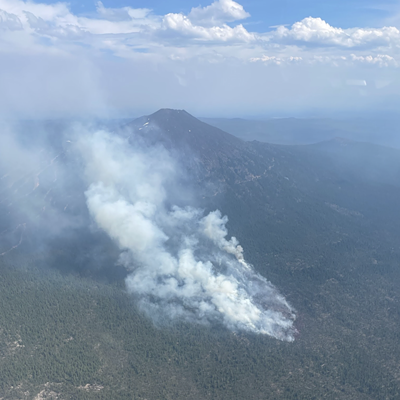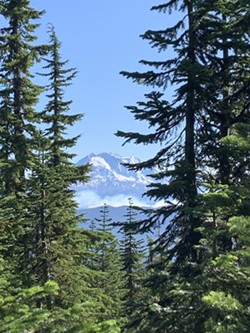
Each year in early spring, thousands of hikers gather in Campo, California near the Mexican border to start a 2,650-mile journey on the storied Pacific Crest Trail. Their goal: to hike, unassisted, through the California, Oregon and Washington wilderness.
It takes most northbound hikers an average of five months to complete the trek. Because most of the trail is buried under snow from October/November through early July, hikers start in the south, usually in March, and in so doing they pass through Oregon forests during the summer months — coinciding with the height of fire season.
This year’s fire season is already at historic levels with more acreage burned so far than in any year since reliable records began, according to authorities. And the season is just hitting its usual peak. Hikers attempting to make it through have had to deal with trail closures, evacuations and smoke – making the always difficult trail outright impossible in some areas.
As a popular stop for resting, refueling and briefly enjoying modern conveniences, Bend and surrounding cities see hundreds of hikers through this time of year.
Mike Dupras, a contractor whose lived in Bend for 27 years, has helped over 150 hikers through parts of central Oregon so far this year. He started volunteering as a “trail angel,” a person who assists PCT hikers, a couple of years ago when a friend’s son was doing the hike and needed a ride to jump ahead on the trail. “Trail angels” is a term of endearment used for people who volunteer to help hikers with rides, food, water and sometimes even a place to stay. Regional Facebook pages connect hikers with angels in a loosely organized way; one can simply post their needs (ie. a ride from one spot to another) and angels will reply. However, some like Dupras go a step further and anticipate what hikers may need – like earlier this summer when the Middle Fork Fire near Crater Lake caused trail closures in the area. Being a long-time central Oregonian, Dupras knows that during fire season you check air quality and fire reports as often as weather.
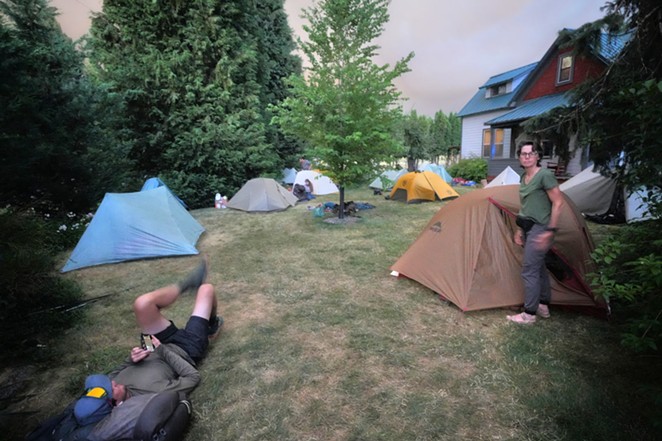
While many are grateful to get around the fires and avoid evacuated areas, Dupras said that others want to miss only what they have to or insist on a continuous foot path that can add hundreds of miles to an already lengthy journey. He’s had to turn hikers down who wanted him to take them just ahead of active wildfires or down closed service roads.
Hélène Grison, a 31-year-old hiker from Paris, France, was four months into her hike and headed toward Trout Lake when she was turned off the trail due to closures. Grison said that on August 6, while trying to cross a forest road, she met rangers who were closing the PCT section she was trying to enter due to the Williams Mine Fire on the southwest flank of Mt. Adams. Luckily, she was able to find a ride to a campsite at Trout Lake where other hikers were resupplying and staying for the night.
“I started to pitch my tent, do the resupply…but the smoke was really bad, we could see the smoke and the sky was really orange,” she said. The area, she was told was in a Level 2, Be Ready evacuation zone and it was likely that at some point in the early morning hours they’d need to immediately leave — a hard thing to do when you have no car and must carry all your belongings on your back. Around midnight, a campground employee told them they should get ready to go.
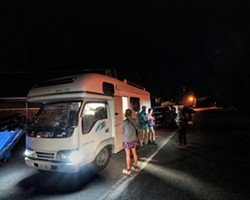
Locals, along with trail angels quickly organized volunteers to evacuate campers. By midnight, Grison said, cars were lined up in front to the campground to take hikers to safety. She was grateful for the help and is OK missing parts of the trail, but she said she’s met others who feel differently. There aren’t many she said, but some will choose to enter closed areas. Others may come back later when the trail reopens to make up portions they missed. Having trekked thousands of miles along the trail this year, she said her concern is for those that walk after her. Being in the wild for months on end is what drew her to the PCT and that experience will look different because the look, the feel of the wilderness is changing with each megafire that ravages the forest. Some vegetation may not grow back, uncountable trees are lost and wildlife is devastated as well.
“I’m really sad about the next generation of PCT hikers because they’re going to have burned forests,” she said. If they’re not on fire, again.
The Pacific Crest Trail Association maintains a running list of trail alerts and closures, at last check there were 23 such notices, 15 of them due to fire.

